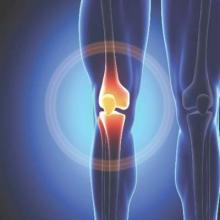Adding telephone coaching to a home-based physiotherapist-prescribed activity program does not increase the pain and function benefits of such a program alone in knee osteoarthritis, a randomized controlled trial shows.
Kim L. Bennell, Ph.D., and her associates recruited volunteers who were aged 50 years and older, had knee pain rated at 4 or higher on an 11-point scale, and were classified as sedentary. One group participated in both coaching and the home-based physiotherapy program; the other participated in the home-based physiotherapy program alone.
Overall,142 (85%), 136 (81%), and 128 (76%) participants completed 6-, 12-, and 18-month measurements. In the 6-month outcomes, no significance differences were found between the two groups in average pain (mean difference, 0.4 units) or in Western Ontario and McMaster Universities Osteoarthritis Index (WOMAC) function (1.8 units). In addition, there was no change between group differences observed at either 12 or 18 months. At 6 months, however, both groups showed large significant and clinically important improvements from baseline in the primary outcomes of pain and function, reported Dr. Bennell of the Centre for Health, Exercise and Sports Medicine at the University of Melbourne.
Reseachers also examined secondary outcomes and found there was no significant difference for change in numeric rating scale walking pain, WOMAC pain, or quality-of-life scores at any time.
“Improving exercise adherence was an aim of our coaching intervention given that adherence is positively linked to clinical outcomes in knee OA,” the reseachers concluded. “Our study provides novel information about the effects of telephone coaching alongside a physiotherapy prescribed physical activity and exercise program and extends the limited research in telephone coaching for OA.”
Read the full study in Arthritis Care & Research (doi: 10.1002/acr.22915).


